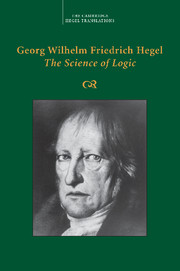Section I - Subjectivity
Published online by Cambridge University Press: 30 September 2021
Summary
The concept is, to start with, formal, the concept in its beginning or as the immediate concept. – In this immediate unity, its difference or its positedness is, first, itself initially simple and only a reflective shine, so that the moments of the difference are immediately the totality of the concept and only the concept as such.
But, second, because it is absolute negativity, the concept divides and posits itself as the negative or the other of itself; yet, because it is still immediate concept, this positing or this differentiation is characterized by the reciprocal indifference of its moments, each of which comes to be on its own; in this division the unity of the concept is still only an external connection. Thus, as the connection of its moments posited as self-subsisting and indifferent, the concept is judgment.
Third, although the judgment contains the unity of the concept that has been lost in its self-subsisting moments, this unity is not posited. It will become posited by virtue of the dialectical movement of the judgment which, through this movement, becomes syllogistic inference, and this is the fully posited concept, for in the inference the moments of the concept as self-subsisting extremes and their mediating unity are both equally posited.
But since this unity itself, as unifying middle, and the moments, as selfsubsisting extremes, stand at first immediately opposite one another, this contradictory relation that occurs in the formal inference sublates itself, and the completeness of the concept passes over into the unity of totality; the subjectivity of the concept into its objectivity.
- Type
- Chapter
- Information
- Publisher: Cambridge University PressPrint publication year: 2010

